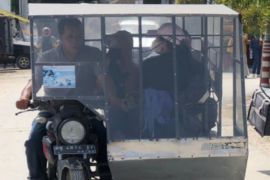Consequently, on May 22, the General Election Commission (KPU) officially declared that the presidential candidate pair number 01 Joko Widodo-Ma'ruf Amin was the winner, with the final tally showing them as having secured 55.50 percent of the national vote, while the candidate pair number 02 Prabowo Subianto-Sandiaga Salahudin Uno had garnered 44.50 percent.
However, a day prior to the winners being announced on Tuesday (May 21), the security situation was marred by protests staged in front of the General Election Supervisory Agency (Bawaslu) on Jalan Thamrin, Central Jakarta, on Jalan KS Tubun Raya, West Jakarta, and at Slipi flyover, West Jakarta.
On Wednesday morning (May 22) until evening, the demonstrations continued unabated, claiming six lives and inflicting injuries on some 200 people.
This event has raised concerns among all parties since if it continues, it can have a dire impact not only on the nation's political situation but also on the economy.
Moreover, the government is making sustained efforts to ensure that the security situation remains conducive and to this end has also promptly secured several protest locations, including the KPU, Bawaslu, shopping centers, and other vital objects.
From an economic standpoint, the prices of shares on the Indonesia Stock Exchange at the market opening took a beating from this adverse situation, plummeting 2.99 percent to 5,948.38 points. Moreover, at the close of the Composite Stock Price Index (CSPI), this downward movement continued to the level of 5,939.64 points.
Concurrently, the rupiah exchange rate against the US dollar in the money market also decreased 45 points, or 0.31 percent, to Rp14,525 per US dollar, from Rp14,480 per US dollar.
Analyst of Indopremier Sekuritas, Mino believes that the market was still upbeat after the KPU declared pair number 01 Widodo- Amin as the winners. However, after a demo, the JCI fell, and the stock transaction went silent.
The market expectation is that the political situation is returning to a state of liquidity after the KPU's declaration, so the new government can run as expected. However, after a demo, the Jakarta Stock Exchange (JCI) dropped," Miko pointed out.
President Director of PT Garuda Futures Ibrahim Assuaibi remarked that the rupiah's weakening today was largely fueled by domestic sentiment, specifically the demonstration staged to reject the results of the KPU's national recapitulation.
Externally, the rupiah's weakening has no effect, and its influence is greater in the country. The KPU's announcement of Joko Widodo (Jokowi) as the clear winner triggered a knee-jerk reaction from the 02 candidate, who did not concede defeat, and his supporters went on a rampage.
"This riot led to market players leaving and resulted in 'profit taking' in the Indonesian market," Assuaibi noted.
In spite of the rupiah and stocks declining, several people believe this trend is short-lived and that the security situation can be maintained and be conducive.
Coordinating Minister for Economic Affairs Darmin Nasution opined that the demonstration on May 22, 2019, will not significantly impact domestic investment and financial markets.
"Yes, it is called market euphoria. The market is just sentimental," he stated.
The security forces were still able to contain the overall mass action to retain the market trust.
The pressure on the domestic financial market is also not solely from domestic conditions but externally also from the trade war between the United States and China that has spurred a reversal of capital flows.
Economic center
The demonstration staged from morning to afternoon, and till dawn, had brought activities at Tanah Abang Market in Central Jakarta to a standstill.
This largest textile and garment trading center in Southeast Asia was compelled to shut down owing to being located close to the Bawaslu demonstration, Jalan KS Tubun, and Slipi flyover.
Shops that generally sell Hajj souvenirs on Jalan Mas Mansyur are closed. The shops of Block A, Block B, Blok F, and Blok G too remained shut.
Similarly, the Sarinah Thamrin shopping center, located directly opposite the Bawaslu building, which had been the epicenter of the demonstration, had closed down since Tuesday (May 21).
"For security and safety reasons, also since access to Sarinah is closed, thereby making it difficult for customers to come. Hence, we chose to close the shop," Sarinah's Corporate Secretary Haslinda Triekasari remarked.
However, trade activities continue at several traditional markets, including the Jatinegara Market, East Jakarta, and Glodok Market, West Jakarta, although they close early as a precautionary measure against untoward incidents.
Typically, the popular Jatinegara market is the hub for selling apparel, which closes at 5 p.m. or 6 p.m. local time, now shuts down at around 2 p.m. local time.
"I can usually bring home income of up to Rp3 million a day, though, today, it is not up to that figure," a clothes trader named Ari remarked.
Trading activities at Lindeteves Trade Center (LTC), West Jakarta, Glodok, were normal and remained unaffected by the demonstration on May 22.
"It is really quiet nowadays, as people fear leaving their houses. However, the shop is still open as usual to continue to serve buyers as usual," Yuliana, one of the traders, remarked.
Despite his concerns over the actions of May 22, which fueled widespread clashes, Yuliana admitted to not being too worried by the activities, as the Indonesian military (TNI)-the Indonesian police
(Polri) officers had secured the LTC Glodok area.
Editor: Bambang Purwanto
Copyright © ANTARA 2019












